2009 CHEVROLET EXPRESS CARGO VAN key
[x] Cancel search: keyPage 88 of 408
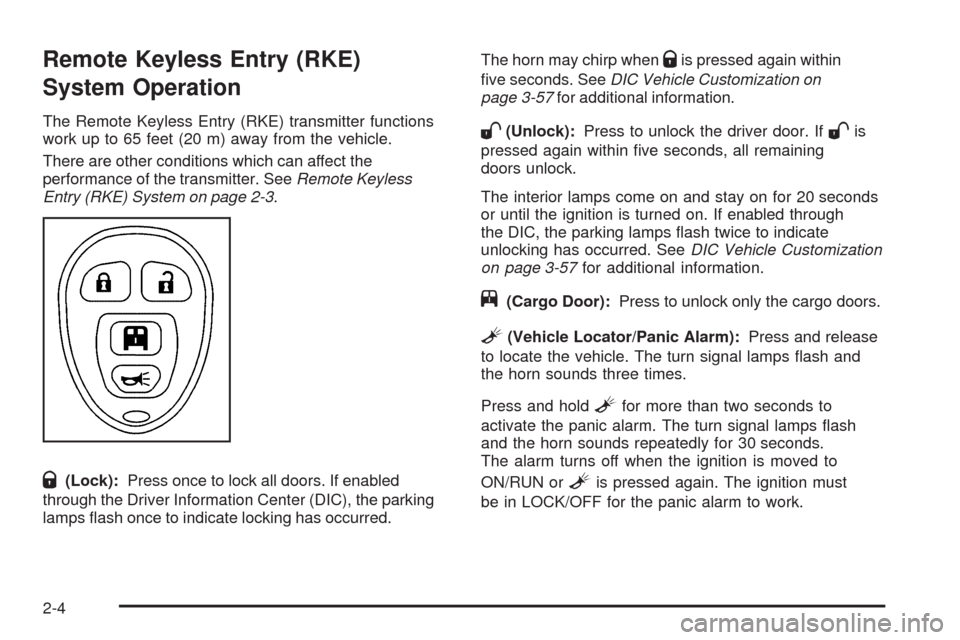
Remote Keyless Entry (RKE)
System Operation
The Remote Keyless Entry (RKE) transmitter functions
work up to 65 feet (20 m) away from the vehicle.
There are other conditions which can affect the
performance of the transmitter. SeeRemote Keyless
Entry (RKE) System on page 2-3.
Q(Lock):Press once to lock all doors. If enabled
through the Driver Information Center (DIC), the parking
lamps flash once to indicate locking has occurred.The horn may chirp when
Qis pressed again within
five seconds. SeeDIC Vehicle Customization on
page 3-57for additional information.
W(Unlock):Press to unlock the driver door. IfWis
pressed again within five seconds, all remaining
doors unlock.
The interior lamps come on and stay on for 20 seconds
or until the ignition is turned on. If enabled through
the DIC, the parking lamps flash twice to indicate
unlocking has occurred. SeeDIC Vehicle Customization
on page 3-57for additional information.
j(Cargo Door):Press to unlock only the cargo doors.
L(Vehicle Locator/Panic Alarm):Press and release
to locate the vehicle. The turn signal lamps flash and
the horn sounds three times.
Press and hold
Lfor more than two seconds to
activate the panic alarm. The turn signal lamps flash
and the horn sounds repeatedly for 30 seconds.
The alarm turns off when the ignition is moved to
ON/RUN or
Lis pressed again. The ignition must
be in LOCK/OFF for the panic alarm to work.
2-4
Page 89 of 408

Programming Transmitters to the
Vehicle
Only RKE transmitters programmed to the vehicle
will work. If a transmitter is lost or stolen, a replacement
can be purchased and programmed through your
dealer/retailer. When the replacement transmitter is
programmed to the vehicle, all remaining transmitters
must also be programmed. Any lost or stolen transmitters
no longer work once the new transmitter is programmed.
Each vehicle can have up to four transmitters
programmed to it. See “Relearn Remote Key” underDIC
Operation and Displays on page 3-41for instructions on
how to match RKE transmitters to your vehicle.
Battery Replacement
Replace the battery if the REPLACE BATTERY IN
REMOTE KEY message displays in the DIC. See
“REPLACE BATTERY IN REMOTE KEY” underDIC
Warnings and Messages on page 3-48for additional
information.
Notice:When replacing the battery, do not touch
any of the circuitry on the transmitter. Static
from your body could damage the transmitter.To replace the battery:
1. Separate the transmitter with a flat, thin object
inserted into the notch on the side of the
transmitter.
2. Remove the old battery. Do not use a metal object.
3. Insert the new battery, positive side facing down.
Replace with a CR2032 or equivalent battery.
4. Snap the transmitter back together.
2-5
Page 90 of 408
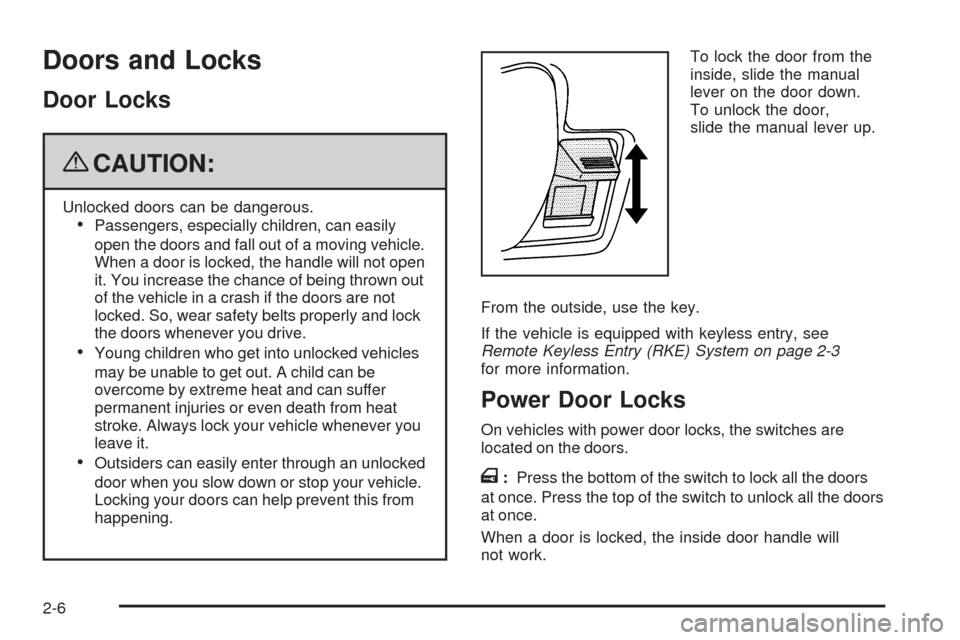
Doors and Locks
Door Locks
{CAUTION:
Unlocked doors can be dangerous.
•Passengers, especially children, can easily
open the doors and fall out of a moving vehicle.
When a door is locked, the handle will not open
it. You increase the chance of being thrown out
of the vehicle in a crash if the doors are not
locked. So, wear safety belts properly and lock
the doors whenever you drive.
•Young children who get into unlocked vehicles
may be unable to get out. A child can be
overcome by extreme heat and can suffer
permanent injuries or even death from heat
stroke. Always lock your vehicle whenever you
leave it.
•Outsiders can easily enter through an unlocked
door when you slow down or stop your vehicle.
Locking your doors can help prevent this from
happening.To lock the door from the
inside, slide the manual
lever on the door down.
To unlock the door,
slide the manual lever up.
From the outside, use the key.
If the vehicle is equipped with keyless entry, see
Remote Keyless Entry (RKE) System on page 2-3
for more information.
Power Door Locks
On vehicles with power door locks, the switches are
located on the doors.
T:Press the bottom of the switch to lock all the doors
at once. Press the top of the switch to unlock all the doors
at once.
When a door is locked, the inside door handle will
not work.
2-6
Page 91 of 408
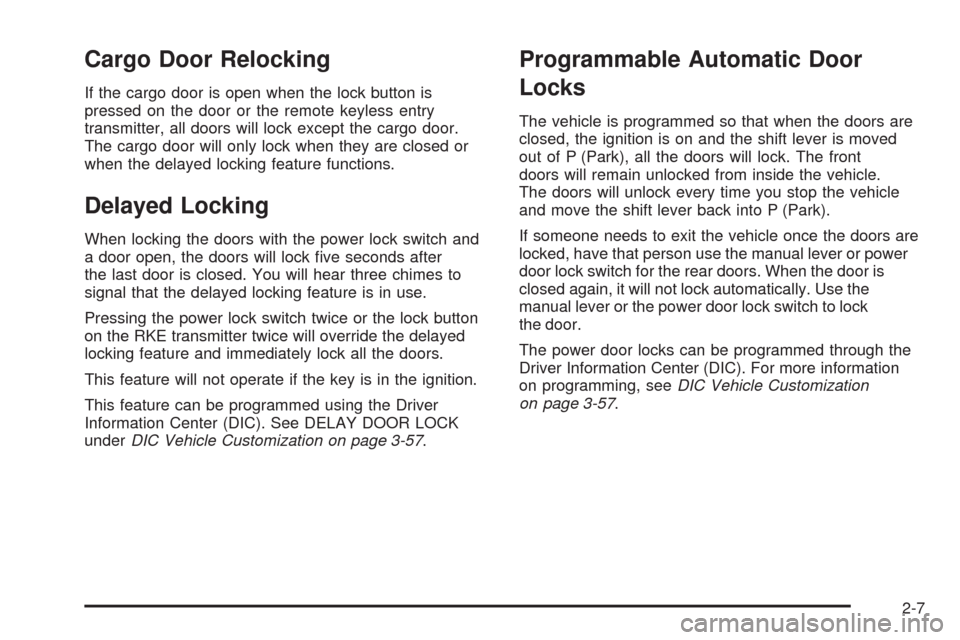
Cargo Door Relocking
If the cargo door is open when the lock button is
pressed on the door or the remote keyless entry
transmitter, all doors will lock except the cargo door.
The cargo door will only lock when they are closed or
when the delayed locking feature functions.
Delayed Locking
When locking the doors with the power lock switch and
a door open, the doors will lock five seconds after
the last door is closed. You will hear three chimes to
signal that the delayed locking feature is in use.
Pressing the power lock switch twice or the lock button
on the RKE transmitter twice will override the delayed
locking feature and immediately lock all the doors.
This feature will not operate if the key is in the ignition.
This feature can be programmed using the Driver
Information Center (DIC). See DELAY DOOR LOCK
underDIC Vehicle Customization on page 3-57.
Programmable Automatic Door
Locks
The vehicle is programmed so that when the doors are
closed, the ignition is on and the shift lever is moved
out of P (Park), all the doors will lock. The front
doors will remain unlocked from inside the vehicle.
The doors will unlock every time you stop the vehicle
and move the shift lever back into P (Park).
If someone needs to exit the vehicle once the doors are
locked, have that person use the manual lever or power
door lock switch for the rear doors. When the door is
closed again, it will not lock automatically. Use the
manual lever or the power door lock switch to lock
the door.
The power door locks can be programmed through the
Driver Information Center (DIC). For more information
on programming, seeDIC Vehicle Customization
on page 3-57.
2-7
Page 93 of 408
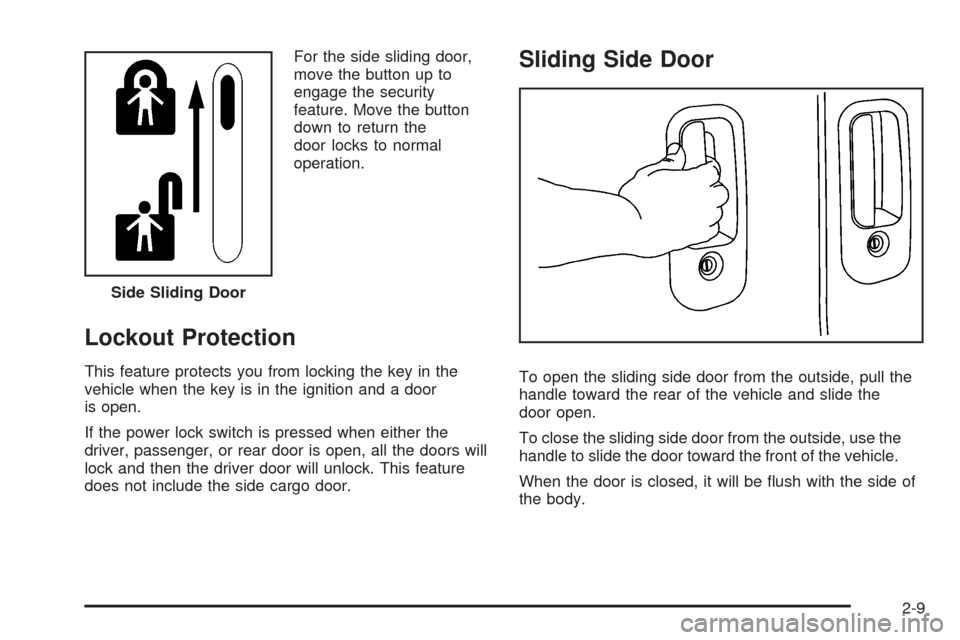
For the side sliding door,
move the button up to
engage the security
feature. Move the button
down to return the
door locks to normal
operation.
Lockout Protection
This feature protects you from locking the key in the
vehicle when the key is in the ignition and a door
is open.
If the power lock switch is pressed when either the
driver, passenger, or rear door is open, all the doors will
lock and then the driver door will unlock. This feature
does not include the side cargo door.
Sliding Side Door
To open the sliding side door from the outside, pull the
handle toward the rear of the vehicle and slide the
door open.
To close the sliding side door from the outside, use the
handle to slide the door toward the front of the vehicle.
When the door is closed, it will be flush with the side of
the body. Side Sliding Door
2-9
Page 98 of 408
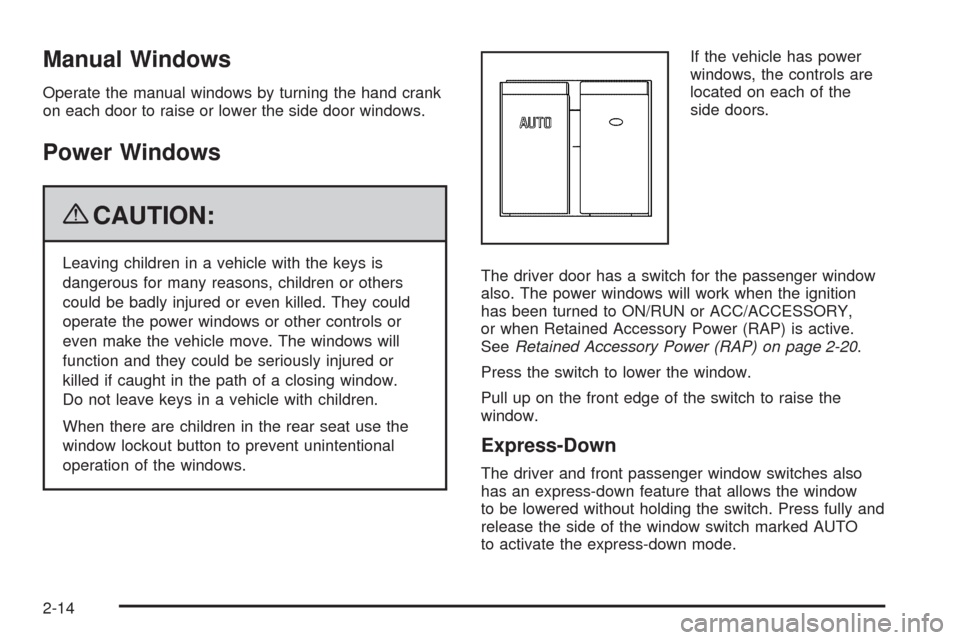
Manual Windows
Operate the manual windows by turning the hand crank
on each door to raise or lower the side door windows.
Power Windows
{CAUTION:
Leaving children in a vehicle with the keys is
dangerous for many reasons, children or others
could be badly injured or even killed. They could
operate the power windows or other controls or
even make the vehicle move. The windows will
function and they could be seriously injured or
killed if caught in the path of a closing window.
Do not leave keys in a vehicle with children.
When there are children in the rear seat use the
window lockout button to prevent unintentional
operation of the windows.If the vehicle has power
windows, the controls are
located on each of the
side doors.
The driver door has a switch for the passenger window
also. The power windows will work when the ignition
has been turned to ON/RUN or ACC/ACCESSORY,
or when Retained Accessory Power (RAP) is active.
SeeRetained Accessory Power (RAP) on page 2-20.
Press the switch to lower the window.
Pull up on the front edge of the switch to raise the
window.
Express-Down
The driver and front passenger window switches also
has an express-down feature that allows the window
to be lowered without holding the switch. Press fully and
release the side of the window switch marked AUTO
to activate the express-down mode.
2-14
Page 101 of 408

PASS-Key®III+ Electronic
Immobilizer
The PASS-Key III+ system operates on a radio
frequency subject to Federal Communications
Commission (FCC) Rules and with Industry Canada.
This device complies with Part 15 of the FCC Rules.
Operation is subject to the following two conditions:
1. This device may not cause harmful interference.
2. This device must accept any interference received,
including interference that may cause undesired
operation.
This device complies with RSS-210 of Industry Canada.
Operation is subject to the following two conditions:
1. This device may not cause interference.
2. This device must accept any interference received,
including interference that may cause undesired
operation of the device.
Changes or modifications to this system by other than
an authorized service facility could void authorization to
use this equipment.
PASS-Key III+ uses a radio frequency transponder in
the key that matches a decoder in the vehicle.
PASS-Key®III+ Electronic
Immobilizer Operation
Your vehicle is equipped with the PASS-Key®III+
(Personalized Automotive Security System)
theft-deterrent system. PASS-Key
®III+ is a passive
theft deterrent system.
The system is automatically armed when the key is
removed from the ignition.
You do not have to manually arm or disarm the system.
The security light will come on if there is a problem
with arming or disarming the theft-deterrent system.
When the PASS-Key
®III+ system senses that someone
is using the wrong key, it shuts down the vehicle’s
starter and fuel systems. The starter will not work and
fuel will stop being delivered to the engine. Anyone
using a trial-and-error method to start the vehicle will be
discouraged because of the high number of electrical
key codes.
If the engine does not start and the security message
comes on, the key may have a damaged transponder.
Turn the ignition off and try again.
2-17
Page 102 of 408
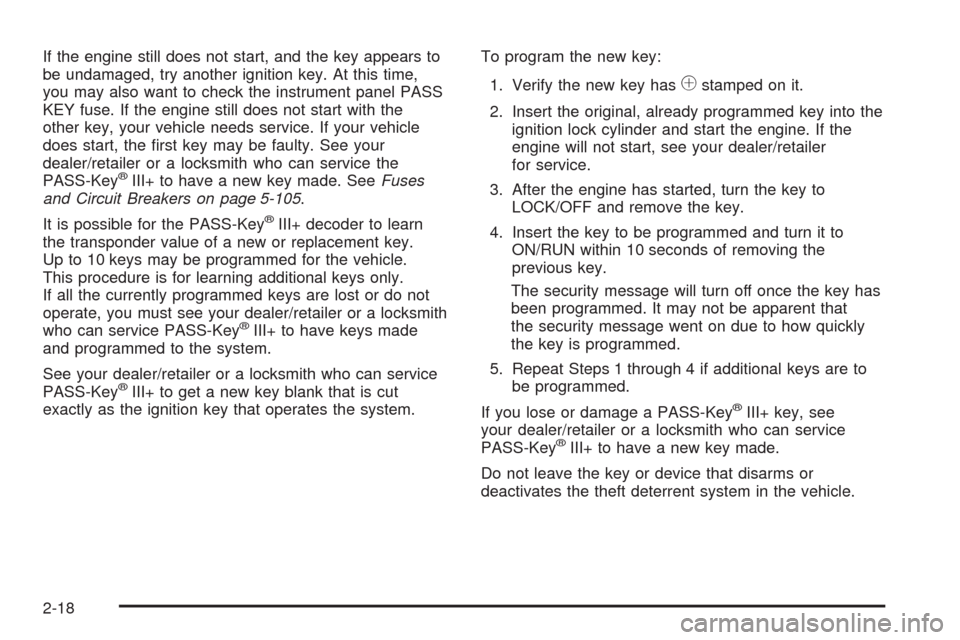
If the engine still does not start, and the key appears to
be undamaged, try another ignition key. At this time,
you may also want to check the instrument panel PASS
KEY fuse. If the engine still does not start with the
other key, your vehicle needs service. If your vehicle
does start, the first key may be faulty. See your
dealer/retailer or a locksmith who can service the
PASS-Key
®III+ to have a new key made. SeeFuses
and Circuit Breakers on page 5-105.
It is possible for the PASS-Key
®III+ decoder to learn
the transponder value of a new or replacement key.
Up to 10 keys may be programmed for the vehicle.
This procedure is for learning additional keys only.
If all the currently programmed keys are lost or do not
operate, you must see your dealer/retailer or a locksmith
who can service PASS-Key
®III+ to have keys made
and programmed to the system.
See your dealer/retailer or a locksmith who can service
PASS-Key
®III+ to get a new key blank that is cut
exactly as the ignition key that operates the system.To program the new key:
1. Verify the new key has
1stamped on it.
2. Insert the original, already programmed key into the
ignition lock cylinder and start the engine. If the
engine will not start, see your dealer/retailer
for service.
3. After the engine has started, turn the key to
LOCK/OFF and remove the key.
4. Insert the key to be programmed and turn it to
ON/RUN within 10 seconds of removing the
previous key.
The security message will turn off once the key has
been programmed. It may not be apparent that
the security message went on due to how quickly
the key is programmed.
5. Repeat Steps 1 through 4 if additional keys are to
be programmed.
If you lose or damage a PASS-Key
®III+ key, see
your dealer/retailer or a locksmith who can service
PASS-Key
®III+ to have a new key made.
Do not leave the key or device that disarms or
deactivates the theft deterrent system in the vehicle.
2-18